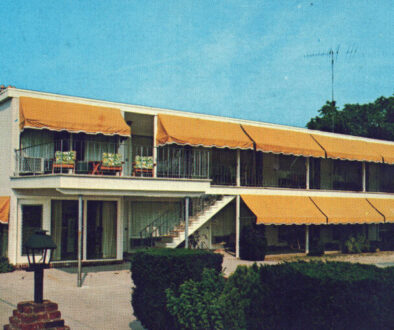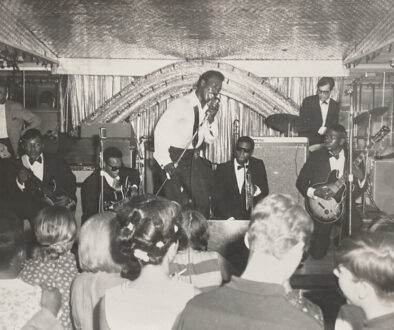The Tale of William Coachman: Kidnapped In Cape May and Sold Into Slavery
Many people have seen the movie Twelve Years a Slave, the true story of a free black man from New York, lured to Washington, D.C. by slave traders and sold into bondage in 1841. But few people know that such things happened right here in Cape May.
In the years before the Civil War, no person of color was truly safe anywhere in the country. Enslavers and bounty hunters tracked those fleeing from slavery in the south across state borders into the north. And even people born free in northern states had little protection from kidnappers who sold them into slavery.
In New Jersey, as elsewhere in the north, sentiment against slavery built with the start of the American Revolution. This was especially the case in the southern part of the state, with its large Quaker population. And for many of the area’s small farmers, it made more sense to hire help rather than hold slaves. So by 1804 there was enough opposition to slavery that the state legislature enacted a gradual emancipation law. It didn’t free people then enslaved, but those born after the law passed would be indentured to their mother’s enslaver and freed when they reached their twenties. New Jersey eventually freed all slaves and ended slavery in 1846.
William Coachman was born a slave in Middle Township, Cape May County around 1775. Elijah Godfrey bought him when he was four years old. When Coachman was about 18 years old, he was sold to George Hand, who wanted him to work his farm.
After several years Hand decided he would be better off hiring someone to do the farm work. So, as the century came to a close, Hand made Coachman a deal. Coachman, then legally a slave-for-life, could instead become an indentured servant. If he agreed to work hard for a nearby farmer for a fixed period of time, the indenture would end and Hand would free Coachman.
The deal was struck and Coachman was sent off to work for Jonathan Leaming. By all accounts Coachman worked diligently, knowing the precise day the arrangement would end and he would be a free man.

All seemed to go well. Leaming later testified that Hand did free Coachman, who stayed in the area, not 10 miles from Hand’s farm, earning money by working for various farmers. A county official later testified that for two years, from 1802 to 1804, William Coachman paid taxes to Middle Township as a free man.
But then everything took a turn for the worse for Coachman. One night in the summer of 1804, as he was sleeping in his bed next to his wife in a cabin close to the Delaware Bay, several men broke down the door. They strode purposefully toward Coachman, clearly knowing where his bed was, and pulled him outside.
It all happened so suddenly and swiftly that his wife didn’t have time to look carefully at the men. She told friends that she had no idea who kidnapped her husband or where they had taken him. Nobody in the area knew what had happened to Coachman. But there was speculation that, in the words of his friend Amos Tommar, someone “took Bill away to the Southward.”
Some of Coachman’s friends in the free black community sought help to find him. They went to Philadelphia to speak with members of the Pennsylvania Abolition Society (PAS), the country’s first anti-slavery organization.

Its official name was the Pennsylvania Society for Promoting the Abolition of Slavery and for the Relief of Free Negroes Unlawfully Held in Bondage. Its goal was to stop the slave trade and enact state laws gradually ending slavery. PAS also provided legal aid to those fleeing slavery, as well as free people unlawfully kidnapped by enslavers.
Members of the Pennsylvania Abolition Society came to Cape May to investigate the Coachman case and deposed his friends and neighbors, both white and black. Everyone testified that William Coachman was free when he was kidnapped.
Elijah Godfrey recounted his regret at selling Coachman to Hand as a slave-for-life, but stated he was gratified to learn that Hand had made Coachman an indentured servant. Bill knew “the time to a day” when he would be freed, testified Godfrey, and when that happened, “the aforesaid Bill came to me and said that he had served his time out and was free. And I set him to work.”
Another white neighbor confirmed Coachman’s determination to work for himself. She too said he knew exactly when the agreement to free him would go into effect. Peter Humphries, a free black man, testified that Hand wanted to hire him to work his farm. Hand had told Humphries he was going to free Coachman in the spring and would need someone else.
But none of these people knew what had happened to Coachman. Some suspected that George Hand had a part in his disappearance. Hand had acted strangely before freeing Coachman. One woman told the PAS that Hand tried hard to get Coachman to go with him to Philadelphia the day before he was to be freed. Hand wouldn’t say why. Coachman refused and not even Hand’s threats could persuade him to leave Cape May.
A free black man also testified that Hand tried to lure Coachman away from the farmer he had been hired out to and return to his farm. Hand promised him a new suit of clothes. But Coachman knew that if he left Leaming’s farm before his contract was up, it would abrogate the indenture agreement to free him.
Despite the best efforts of the PAS lawyers, the investigation yielded no firm clues as to Coachman’s whereabouts. About all anyone knew was that Coachman was a free man when he was kidnapped and probably sold into slavery down south. It seemed possible that William Coachman’s quest for freedom had ended.
But, many months later, a knock on the door of noted Philadelphia abolitionist Isaac Hopper changed everything. Hopper, an early member of the PAS, was known in the city as a public advocate for kidnap victims. Many also knew that his home was a safe haven for people fleeing slavery.
The man at his door was a free black sailor named Tate who worked aboard a ship that had just docked in Philadelphia harbor. As soon as it tied up, Tate had made his way to Hopper and related a harrowing tale.
Henry Course captained Tate’s ship, which carried cargo between Savannah and Philadelphia. Two years before Coachman disappeared, Hand illegally sold him to Course for $180. Although Course knew Coachman was already a free man, the bill of sale labeled him a “slave for life.” Course intended to take him south and sell him. But it took Hand and Course two years to seal the arrangement.
Course abducted Coachman in the middle of the night on his way to Savannah. Coachman was kept tied up until the boat was clear of the Delaware Bay and any chance he would jump overboard and swim back.
Course brought his captive to Georgia, where he sold him to a Captain Spencer for $320. Then he returned to Philadelphia. It took another round trip between the two cities before Tate was able to reach Hopper and tell his story.
Enraged, Hopper went with Tate to the mayor and demanded the arrest of Captain Course for illegal kidnapping. A warrant for Course’s arrest was issued, but Hopper had a hard time getting anyone to serve it because yellow fever raged in the streets near where the ship was anchored. Finally Hopper got a constable and two free blacks to row out to the boat; they soon found Course.
Course admitted buying Coachman, but denied knowing he was a free man. Course and the ship’s owner, Savage Stillwell, were formally arrested, bail was set at the hefty sum of $1500, and they were ordered to appear at the Mayor’s Court.
Course quickly struck a deal for his release. He agreed to return to Savannah and bring back Coachman. In exchange he would get back his hefty bail and would not be jailed.
Course set out for Georgia and found Captain Spencer. He explained that Coachman was a free man and needed to be brought back to Philadelphia. Spencer agreed, but demanded back the money he had paid Course for Coachman. Course told Spencer he would pay the money when he picked up Coachman and was ready to sail for Philadelphia. In a day or two, Course arrived at Spencer’s place and announced he was ready to pay for Coachman. But when they called for Coachman to board the ship, he was nowhere to be found.
Course acted distressed, saying he couldn’t go back to Philadelphia without the man. He printed up flyers, offering a large reward for him. And when Spencer acted dubious about Coachman’s disappearance, Course opened his ship’s hatches and offered to let it be searched. Reluctantly Spencer accepted that Coachman had somehow fled. So Course set sail for Philadelphia ostensibly without Coachman.
But the truth was that Coachman had been secreted on board Course’s ship. And soon he was returned to Cape May. Course managed to bring back Coachman and keep the money Spencer had paid him for Coachman.
But that is not the end of the story.
About a year later, Spencer heard that Coachman had returned home. Spencer went to Isaac Hopper’s house in Philadelphia, demanding to know if that were true. When he learned it was, he hired a carriage and set out for Cape May. Meanwhile Coachman heard that Spencer was after him and left Cape May for Philadelphia and Isaac Hopper’s house.
Spencer retraced his steps to Philadelphia. He had Coachman arrested at Hopper’s house. But Hopper went to court and presented documents proving Coachman was a free man. Coachman was released from jail.
Unable to lay claim to Coachman, Spencer offered a huge reward for Captain Course. In his mind Course had stolen his property. But it was now Course who was missing. Finally Spencer gave up and went back to Georgia.
In 1814 William Coachman bought an acre of land in Middle Township, and lived there until his death in 1825.
Coachman had a role in fighting slavery even after his death. In the 1840s, Isaac Hopper wrote a series of articles about free blacks kidnapped in northern cities such as Philadelphia. They were published in the leading abolitionist newspaper, the National Anti-Slavery Standard. The stories shocked many northerners who had considered slavery a southern problem. The articles confronted them with the fact that its horrors reached their doorstep. One of Hopper’s stories was the tale of
William Coachman.



